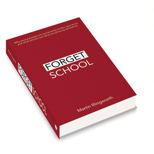Time for a New Era for the English Curriculum?
Associate, author and English specialist Martin Illingworth thinks so
When studying the history of English, it is usually split into three broad time periods of development:
- Old English (450AD to 1150AD)
- Middle English (1150AD TO 1500AD)
- Modern English (1500AD to the present).
But how up to date is modern English?
The advent of the internet has had profound implications for the English language, after all.
Is it perhaps time to embrace a new fourth period of the language – Post-Modern English?
In tandem with this, is it time for the teaching of English to embrace this change and look to a future that to some extent is already here?
Keyboard skills rather than handwriting
Young people in schools today have always lived with access to the internet.
It is their instinctive means of communication.
The main ways that they read and write are through this medium.
They write extensively on devices that require keyboard skills rather than handwriting.
There is no adult world waiting for the capacity to handwrite anymore.
Digital proficiency is key to a young person being alerted to, and having the opportunity to, take advantage of the potential bright futures of the 21st century.
Our curriculum can no longer ignore the ways that communication has moved on.
Writers that look like them and that speak to their lives.
Similarly, the make up of our society has diversified, broadened, and become much more multi-cultural.
Our students need to read literature that includes a whole range of celebrated writers.
Our children deserve to be reading, in school, a canon that has writers in it that look like them and that speak to their lives.
Great foundational literature must be taught alongside fresher and more representative voices.
The reading of physical books is making something of a comeback (see this recent article from Monocle magazine on the topic), but the young need persuading that this is going to be a lifelong interest of theirs.
Something worth saying
In experiencing literature in the classroom, our children must not be passive observers of these writers and their audiences.
They need to feel that they too are the writers and readers.
Teachers of English need to find a language that supports children in believing that they have something worth saying and an audience to say it to.
Perhaps the best of what has been written and said is yet to come?
An education of hope would suggest that this can be so.
Time to move on?
In the coming years it has been estimated that over half of all our young people will be self-employed*.
They are going to need to be articulate and confident in their expression.
We need to attend to this need for clear and dynamic expression to support them in their real world aims, past the artificial environment of the classroom.
They must become discerning and critical readers of a whole range of texts, with online domains included here if schooling is to remain relevant.
A diet of writing newspaper reports and wondering what Romantic poets meant by this line or that is no longer expansive enough to meet the needs of those wanting to be articulate in the 21st Century.
Time to move on?
I think so.
 Find out more about Martin Illingworth and how to book him to speak at your school of conference here.
Find out more about Martin Illingworth and how to book him to speak at your school of conference here.
And for more on what young people really need from their education, check out Martin's book Forget School, published by the Independent Thinking Press.
Use the code 'ITL20' at checkout for 20% off and free UK p+p.
*Or, given advances in AI, not employed at all.

Martin Illingworth
Enjoy a free no-obligation chat.
Haggle a bit. Make a booking.
Call us on +44 (0)1267 211432 or drop us a line at learn@independentthinking.co.uk.

About the author
Martin Illingworth
Martin Illingworth is an English specialist with many years as a teacher and Senior Lecturer in Education at Sheffield Hallam University. As well as books written around his subject specialism, he has also written Think Before You Teach and the controversial (but highly post-Covid world relevant) Forget School.